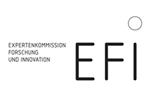Excellent qualified personnel is a precondition for research and development, for innovation and the economic utilization and implementation of scientific findings. Sufficient access to a highly qualified labour force is increasingly becoming a key factor for competitiveness and economic performance - in single companies as well as in the whole economy. Structural change across sectors and the increasing knowledge intensification of the economy are connected with changing requirements for the qualification of the labour force. Therefore the topic of education and qualification as a basis for Germany's technological performance is a permanent part of the studies on the German innovation system that is annually commissioned by the Commission of Experts for Research and Innovation (EFI).
The Commission of Experts for Research and Innovation (EFI) established by the Federal Government, provides research-based policy advice. The Commission presents an annual report on research, innovation and technological performance in Germany and submits proposals for national research and innovation policy. The EFI reports are based on the annual "Studies on the German innovation system" that it commissions, and other research. Among these studies the DZHW is responsible for that on "Education and Qualification" as coordinating and managing institution, collaborating regularly with the Center for Economic Policy Studies (CWS) and the Sociological Research Institute at Göttingen University (SOFI).The main aim of the project is to work with experts from other scientific institutions to provide an indicator-based study on higher education, vocational and further training, the educational achievement of the population and the qualifications needed in economy and society. The indicators are reported as time series and, if possible, in a comparative perspective.
The indicator-based report is supplemented in some years by chapters or self-contained reports covering changing themes (only available in German), including changes in the relationships between higher education and vocational training, educational and labour participation of women in S&T or the transition from bachelor's to master's programmes.


